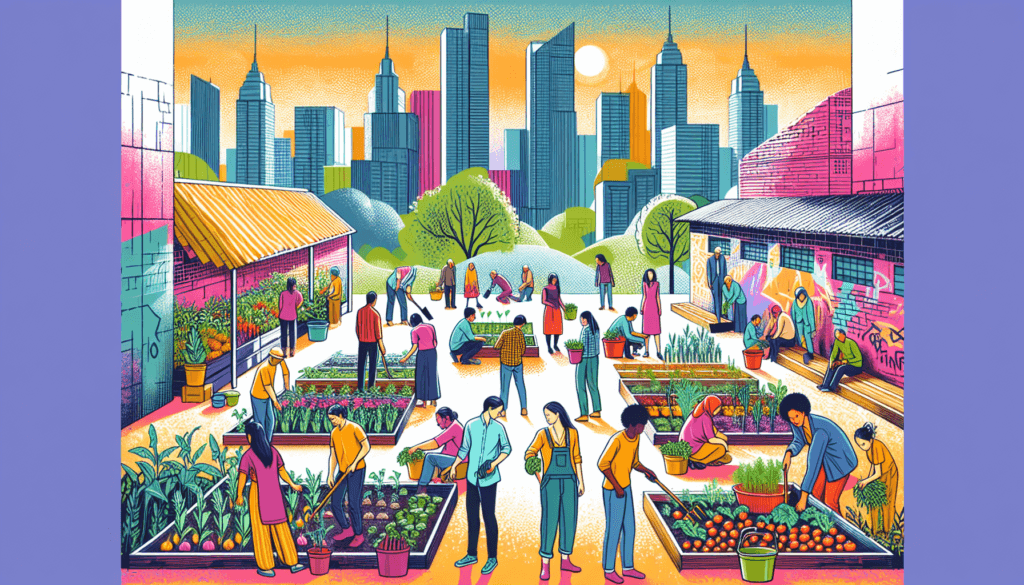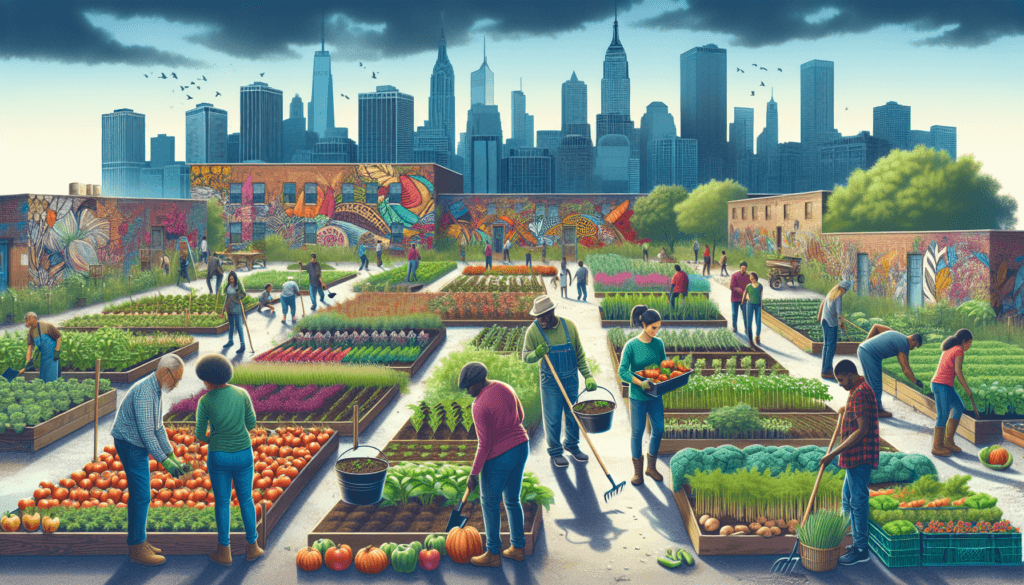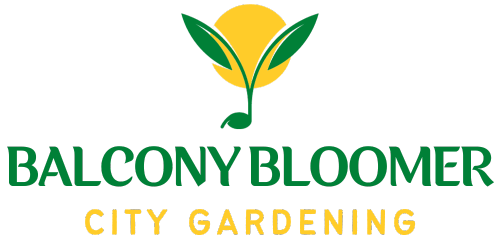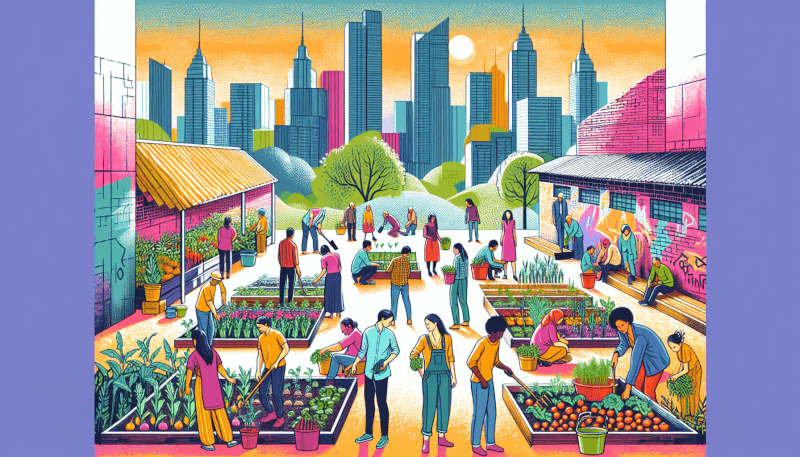Urban gardening has emerged as a powerful tool in addressing issues of food justice and equity in urban communities. By utilizing small spaces and leveraging local resources, individuals and communities are able to grow their own fresh produce, reducing their reliance on traditional food systems and increasing access to nutritious food. This article explores the impact of urban gardening on food justice and equity, highlighting the ways in which it empowers individuals, strengthens communities, and promotes a more sustainable and equitable food system.

What is Urban Gardening?
Urban gardening refers to the practice of growing plants, vegetables, and fruits in urban areas, such as cities and towns, where space is limited. It is a way for individuals and communities to engage in agricultural activities and produce their own food in urban environments. Urban gardening can take various forms, such as community gardens, rooftop gardens, vertical gardens, and window gardens. These spaces allow people to cultivate their own green spaces even in densely populated areas.
Definition of Urban Gardening
Urban gardening can be defined as the cultivation of plants and food in urban areas, making use of limited space and resources. It involves the practice of growing plants using various techniques such as soil-based gardening, hydroponics, and container gardening. The primary objective of urban gardening is to bring agriculture and nature into urban settings, providing individuals and communities access to fresh and nutritious food while promoting environmental sustainability.
Importance of Urban Gardening in Urban Areas
Urban gardening plays a crucial role in urban areas for several reasons. Firstly, it helps address the issue of food security by providing individuals and communities with access to fresh produce. This is particularly important in areas where access to healthy and affordable food is limited, also known as food deserts. Urban gardening allows people to grow their own food and contribute to their overall nutritional well-being.
Secondly, urban gardening helps beautify urban areas by introducing green spaces. It enhances the aesthetic appeal of cities and towns, improving the quality of life for residents. Urban gardens provide a relaxing and peaceful environment, which can have positive effects on mental health and overall well-being.
Lastly, urban gardening promotes environmental sustainability by reducing the carbon footprint associated with transporting food over long distances. By growing food locally, urban gardens help decrease the reliance on conventional agricultural practices, which often involve the use of pesticides and fertilizers. Urban gardening encourages the use of organic and sustainable farming practices, contributing to a healthier and more environmentally friendly urban ecosystem.
Benefits of Urban Gardening
Urban gardening offers a multitude of benefits for individuals, communities, and the environment. One of the key benefits is the access to fresh and healthy food. By growing their own produce, individuals can ensure that their food is free from harmful chemicals and pesticides. This not only improves their overall health but also allows them to save money by reducing dependency on grocery stores.
Another benefit of urban gardening is the opportunity for education and skill development. Gardening provides a hands-on learning experience for individuals of all ages. It teaches valuable lessons about sustainability, biology, and the importance of caring for the environment. Through gardening, individuals can develop practical skills in plant cultivation, soil management, and pest control.
Urban gardening also fosters a sense of community and social cohesion. Community gardens, in particular, bring people together and create spaces for interaction and cooperation. These gardens provide opportunities for individuals to socialize, share knowledge, and work towards a common goal. The sense of community that develops in urban gardens helps strengthen social bonds and build resilient neighborhoods.
Furthermore, urban gardening contributes to the overall environmental health of urban areas. Plants play a crucial role in air purification by absorbing carbon dioxide and releasing oxygen. Urban gardens help mitigate the effects of air pollution, reduce urban heat island effect, and provide habitats for pollinators and other wildlife. This leads to a more sustainable and resilient urban ecosystem.
Why Food Justice and Equity Matters?
Understanding Food Justice and Equity
Food justice refers to the belief that all individuals, regardless of their socioeconomic status or background, should have equal access to healthy and nutritious food. It is about ensuring that everyone has the ability to make informed choices about the food they consume and that their access to food is not limited by factors such as income, race, or geography.
Food equity, on the other hand, focuses on the fair distribution of resources and opportunities related to food. It recognizes that systemic inequities and structural barriers can prevent certain communities from accessing affordable and healthy food. Food equity aims to address these disparities and create a more just food system.
The Impact of Inequitable Food Systems
Inequitable food systems have significant impacts on individuals and communities. When certain communities lack access to fresh and healthy food, they are more prone to developing diet-related diseases such as obesity, diabetes, and heart disease. This perpetuates existing health disparities and negatively affects the overall well-being of these communities.
Moreover, inequitable food systems contribute to social and economic inequalities. Limited access to affordable and nutritious food can hinder individuals’ ability to thrive and achieve their full potential. It can restrict educational and economic opportunities, perpetuating cycles of poverty and inequality.
The Link Between Urban Gardening and Food Justice
Urban gardening plays a crucial role in promoting food justice and equity. By providing individuals and communities with the means to grow their own food, urban gardening helps address the barriers and inequities present in the food system. It allows people to take control of their food production, ensuring that they have access to fresh and nutritious food.
Urban gardening empowers communities to become self-sufficient and less dependent on traditional food sources. It reduces reliance on unhealthy processed foods and promotes the consumption of locally grown, organic produce. This can have positive effects on the health and well-being of individuals, particularly those in low-income communities.
Furthermore, urban gardening creates opportunities for education and capacity building. It helps individuals develop gardening skills and knowledge about sustainable food production. By engaging in urban gardening, communities can learn about the importance of biodiversity, soil health, and ecological balance. This knowledge can be shared within the community, fostering a sense of empowerment and self-reliance.

Challenges in Achieving Food Justice and Equity
Food Deserts and Limited Access to Fresh Produce
One of the key challenges in achieving food justice and equity is the existence of food deserts in urban areas. Food deserts are areas where residents have limited access to affordable and nutritious food. Supermarkets and grocery stores are often far away, and residents may rely on convenience stores and fast food outlets for their food needs.
To address this challenge, urban gardening initiatives can play a crucial role. By establishing community gardens and urban farms within food deserts, residents can have direct access to fresh produce. This reduces their reliance on unhealthy and processed foods while increasing their ability to make healthier food choices.
Income Disparities and Food Affordability
Income disparities and food affordability are major barriers to achieving food justice and equity. Low-income communities often struggle to afford fresh and healthy food due to limited financial resources. This can lead to a reliance on inexpensive processed foods that are high in calories and low in nutritional value.
Urban gardening can help address this challenge by providing an affordable means of food production. By growing their own food, individuals and communities can save money on grocery bills. In addition, urban gardening initiatives can provide resources such as seeds, tools, and education, making it more accessible to low-income individuals.
Racial and Ethnic Disparities in Food Access
Racial and ethnic disparities in food access are another significant challenge in achieving food justice and equity. Certain communities, particularly those that are predominantly Black, Indigenous, or people of color (BIPOC), have historically faced systemic barriers in accessing healthy and nutritious food.
Urban gardening initiatives can help address these disparities by focusing on inclusivity and providing resources to marginalized communities. By engaging with BIPOC communities and understanding their unique needs and perspectives, urban gardening initiatives can ensure that everyone has equal access to the benefits of urban gardening.
Urban Gardening as a Solution for Food Justice and Equity
Increasing Access to Fresh and Affordable Food
One of the key ways urban gardening contributes to food justice and equity is by increasing access to fresh and affordable food. By growing their own produce, individuals and communities can ensure a constant supply of fresh fruits, vegetables, and herbs. This reduces their reliance on food sources that may be inaccessible or unaffordable.
Empowering Communities Through Gardening
Urban gardening empowers communities by giving them the skills and knowledge to grow their own food. By engaging in gardening activities, communities become self-sufficient and less dependent on external food sources. This not only enhances their food security but also instills a sense of pride and self-reliance.
Building Local Food Resilience
Urban gardening contributes to building local food resilience by promoting sustainable and localized food systems. By producing food within urban areas, communities become less reliant on industrialized agriculture and long-distance transportation. This reduces the carbon footprint associated with food production and strengthens the overall resilience of the local food system.

Types of Urban Gardens
Community Gardens
Community gardens are shared spaces where individuals and community members come together to grow their own food. These gardens are typically organized and managed collectively, with individuals taking ownership of specific plots. Community gardens foster a sense of community and cooperation while providing opportunities for social interaction and the sharing of gardening knowledge.
Rooftop Gardens
Rooftop gardens utilize the otherwise unused space on rooftops to grow plants and food. These gardens can be created on commercial or residential buildings, providing an additional green space in densely populated urban areas. Rooftop gardens help regulate indoor temperatures, reduce stormwater runoff, and provide a serene environment for relaxation and enjoyment.
Vertical Gardens
Vertical gardens, also known as green walls or living walls, use vertical space to grow plants. These gardens are ideal for areas with limited horizontal space, as they utilize walls or other vertical structures to support plant growth. Vertical gardens provide aesthetic appeal, improve air quality, and can be used to grow a variety of plants, including herbs, vegetables, and flowers.
Window Gardens
Window gardens involve growing plants in containers placed on windowsills or attached to windows. These gardens are perfect for individuals with limited space, as they make use of windows as a source of light for plant growth. Window gardens can be used to grow herbs, small vegetables, and flowering plants, adding beauty to urban living spaces.
Benefits of Urban Gardening for Food Justice
Improving Food Security
Urban gardening improves food security by providing individuals and communities with a consistent and affordable supply of fresh produce. With the ability to grow their own food, individuals have a reliable and accessible source of nutritious food. This reduces the risk of food insecurity and promotes a healthier and more resilient community.
Providing Nutritious Food Options
Urban gardening promotes access to nutritious food options. By growing a variety of fruits, vegetables, and herbs, individuals can ensure a diverse and balanced diet. This reduces the reliance on processed and unhealthy foods, leading to improved health outcomes and decreased risks of diet-related diseases.
Educating and Empowering Communities
Urban gardening provides educational opportunities for individuals and communities. Through gardening, individuals can learn about sustainable farming practices, organic gardening, and the importance of biodiversity. This knowledge can be shared within the community, empowering individuals to make informed choices about their food and environment.
Promoting Social Cohesion
Community gardens and urban gardening initiatives foster social cohesion by bringing people together. These spaces create opportunities for individuals from diverse backgrounds to interact, share knowledge, and work towards a common goal. The sense of community that develops in urban gardens strengthens social bonds and creates resilient and inclusive neighborhoods.

Promoting Equity in Urban Gardening
Addressing Barriers to Participation
To promote equity in urban gardening, it is important to address barriers to participation. This includes making gardening resources such as seeds, tools, and land more accessible to marginalized communities. Additionally, initiatives should consider cultural sensitivities and adapt gardening practices to suit diverse backgrounds and preferences.
Engaging Marginalized Communities
To ensure equity in urban gardening, it is essential to actively engage marginalized communities. This involves listening to their needs and perspectives, involving them in the planning and decision-making processes, and providing culturally appropriate resources. By prioritizing inclusion and representation, urban gardening initiatives can create spaces that are truly equitable and inclusive.
Ensuring Accessible and Inclusive Spaces
Equity in urban gardening also involves creating accessible and inclusive spaces. This means considering the needs of individuals with disabilities and ensuring that gardening spaces are physically accessible. It also involves providing resources in different languages, using visual aids, and incorporating sensory elements to make gardening spaces inclusive for individuals with diverse abilities.
Successful Urban Gardening Initiatives
Growing Power in Milwaukee, USA
Growing Power, based in Milwaukee, USA, was a pioneering urban farming and community-based food system organization. It focused on providing sustainable alternatives to traditional food systems in urban areas. Through its initiatives, Growing Power addressed issues of food justice and equity by engaging communities in urban agriculture and creating training and employment opportunities.
The Rooftop Gardens of Singapore
Singapore is known for its innovative approach to urban gardening, particularly in the form of rooftop gardens. The city has embraced rooftop gardening as a way to maximize the limited available space and promote environmental sustainability. These rooftop gardens not only provide fresh produce but also contribute to urban greening, stormwater management, and biodiversity conservation.
The Vertical Gardens of Medellín, Colombia
The city of Medellín in Colombia is renowned for its innovative vertical gardens, which have transformed the urban landscape. These gardens utilize vertical space, such as building facades and highway pillars, to create lush green areas. The vertical gardens of Medellín help improve air quality, mitigate the effects of urban heat, and provide a visually appealing environment for residents.
Tokyo’s Urban Agriculture Movement
Tokyo has witnessed a surge in urban agriculture initiatives, driven by the desire to create a sustainable and resilient food system. The city has implemented various programs to support urban gardening, including rooftop gardens, vacant lot cultivation, and community gardens. These initiatives promote local food production, reduce food waste, and enhance community well-being.

Policy and Advocacy for Urban Gardening and Food Justice
Urban Agriculture Policies
To promote urban gardening and food justice, policymakers can implement urban agriculture policies. These policies can include measures such as zoning regulations that support the creation of community gardens, incentives for rooftop or vertical gardens, and funding opportunities for urban farming initiatives. By integrating urban agriculture into urban planning, policymakers can create an environment that supports equitable and sustainable food systems.
Collaboration Between Government and Community
Collaboration between government agencies and community organizations is essential for promoting urban gardening and achieving food justice. Governments can provide resources, funding, and technical assistance, while community organizations can contribute local knowledge and grassroots expertise. By working together, these stakeholders can create initiatives that address the specific needs and challenges of their communities.
Advocacy for Equitable Food Systems
Advocacy plays a crucial role in driving change and creating awareness about the importance of equitable food systems. Advocacy efforts can include campaigns, workshops, and educational programs that highlight the benefits of urban gardening and advocate for policies that support food justice. By mobilizing communities and raising awareness, advocacy can create a strong and unified voice for change.
Conclusion
Urban gardening has emerged as a powerful solution for achieving food justice and equity in urban areas. By growing their own food, individuals and communities can address the barriers and inequities present in the food system. Urban gardening improves food security, promotes healthy eating habits, and empowers communities. It fosters social cohesion, builds local food resilience, and contributes to environmental sustainability. With the right policies and collaborative efforts, urban gardening can play a pivotal role in creating a more just and equitable food system for all.


